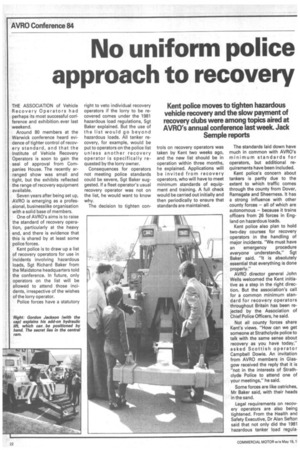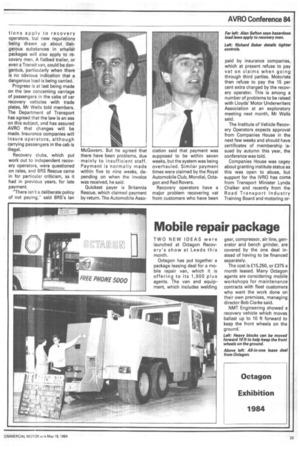No uniform police approach to recovery
Page 24

Page 25

If you've noticed an error in this article please click here to report it so we can fix it.
Kent police moves to tighten hazardous vehicle recovery and the slow payment of recovery clubs were among topics aired at AVRO's annual conference last week. Jack Semple reports
THE ASSOCIATION of Vehicle Recovery Operators had perhaps its most successful conference and exhibition ever last weekend.
Around 80 members at the Warwick conference heard evidence of tighter control of recovery standard, and that the Institute of Vehicle Recovery Operators is soon to gain the seal of approval from Companies House. The recently arranged show was small and tight, but the exhibits reflected the range of recovery equipment available.
Seven years after being set up, AVRO is emerging as a professional, businesslike organisation with a solid base of members.
One of AVRO's aims is to raise the standard of recovery operation, particularly at the heavy end, and there is evidence that this is shared by at least some police forces.
Kent police is to draw up a list of recovery operators for use in incidents involving hazardous loads, Sgt Richard Baker from the Maidstone headquarters told the conference. In future, only operators on the list will be allowed to attend those incidents, irrespective of the wishes of the lorry operator.
Police forces have a statutory right to veto individual recovery operators if the lorry to be recovered comes under the 1981 hazardous load regulations, Sgt Baker explained. But the use of the list would go beyond hazardous loads. All tanker recovery, for example, would be put to operators on the police list unless another recovery operator is specifically requested by the lorry owner.
Consequences for operators not meeting police standards could be severe, Sgt Baker suggested. If a fleet operator's usual recovery operator was not on the list, he would want to know why.
The decision to tighten con trols on recovery operators was taken by Kent two weeks ago, and the new list should be in operation within three months, he explained. Applications will be invited from recovery operators, who will have to meet minimum standards of equipment and training. A full check would be carried out initially and then periodically to ensure that standards are maintained. The standards laid down have much in common with AVRO's minimum standards for operators, but additional requirements have been included.
Kent police's concern about tankers is partly due to the extent to which traffic comes through the county from Dover, Ramsgate and Sheerness. It has a strong influence with other county forces — all of which are autonomous — because it trains officers from 26 forces in England on hazardous loads.
Kent police also plan to hold two-day courses for recovery operators in the handling of major incidents. "We must have
an emergency procedure everyone understands," Sgt Baker said. "It is absolutely essential that everything is done properly."
AVRO director general John Wells welcomed the Kent initiative as a step in the right direction. But the association's call for a common minimum standard for recovery operators throughout Britain has been rejected by the Association of Chief Police Officers, he said.
Not all county forces share Kent's views. "How can we get someone at Strathclyde police to talk with the same sense about recovery as you have today," asked Scottish operator Campbell Dowie. An invitation from AVRO members in Glasgow received the reply that it is "not in the interests of Strathclyde Police to attend one of your meetings," he said.
Some forces are like ostriches, Mr Baker said, with their heads in the sand. tions apply to recovery operators, but new regulations being drawn up about dangerous substances in smaller packages will also apply to recovery men. A flatbed trailer, or even a Transit van, could be dangerous, particularly when there is no obvious indication that a dangerous load is being carried.
Progress is at last being made on the law concerning carriage of passengers in the cabs of car recovery vehicles with trade plates, Mr Wells told members. The Department of Transport has agreed that the law is an ass on this subject, and has assured AVRO that changes will be made. Insurance companies will insure operators, although carrying passengers in the cab is illegal.
Recovery clubs, which put work out to independent recovery operators, were questioned on rates, and BRS Rescue came in for particular criticism, as it had in previous years, for late payment.
"There isn't a deliberate policy of not paying," said BRS's Ian McGovern. But he agreed that there have been problems, due mainly to insufficient staff. Payment is normally made within five to nine weeks, depending on when the invoice was received, he said.
Quickest payer is Britannia Rescue, which claimed payment by return. The Automobile Asso ciation said that payment was supposed to be within seven weeks, but the system was being overhauled. Similar payment times were claimed by the Royal Automobile Club, Mondial, Octagon and Red Rovers.
Recovery operators have a major problem recovering vat from customers who have been paid by insurance companies, which at present refuse to pay vat on claims when going through third parties. Motorists then refuse to pay the 15 per cent extra charged by the recovery operator. This is among a number of problems to be raised with Lloyds' Motor Underwriters Association at an exploratory meeting next month, Mr Wells said.
The Institute of Vehicle Recovery Operators expects approval from Companies House in the next few weeks and should have certificates of membership issued by autumn this year, the conference was told.
Companies House was cagey about granting institute status as this was open to abuse, but support for the IVRO has come from Transport Minister Lynda Chalker and recently from the Road Transport Industry Training Board and motoring or
























































































































